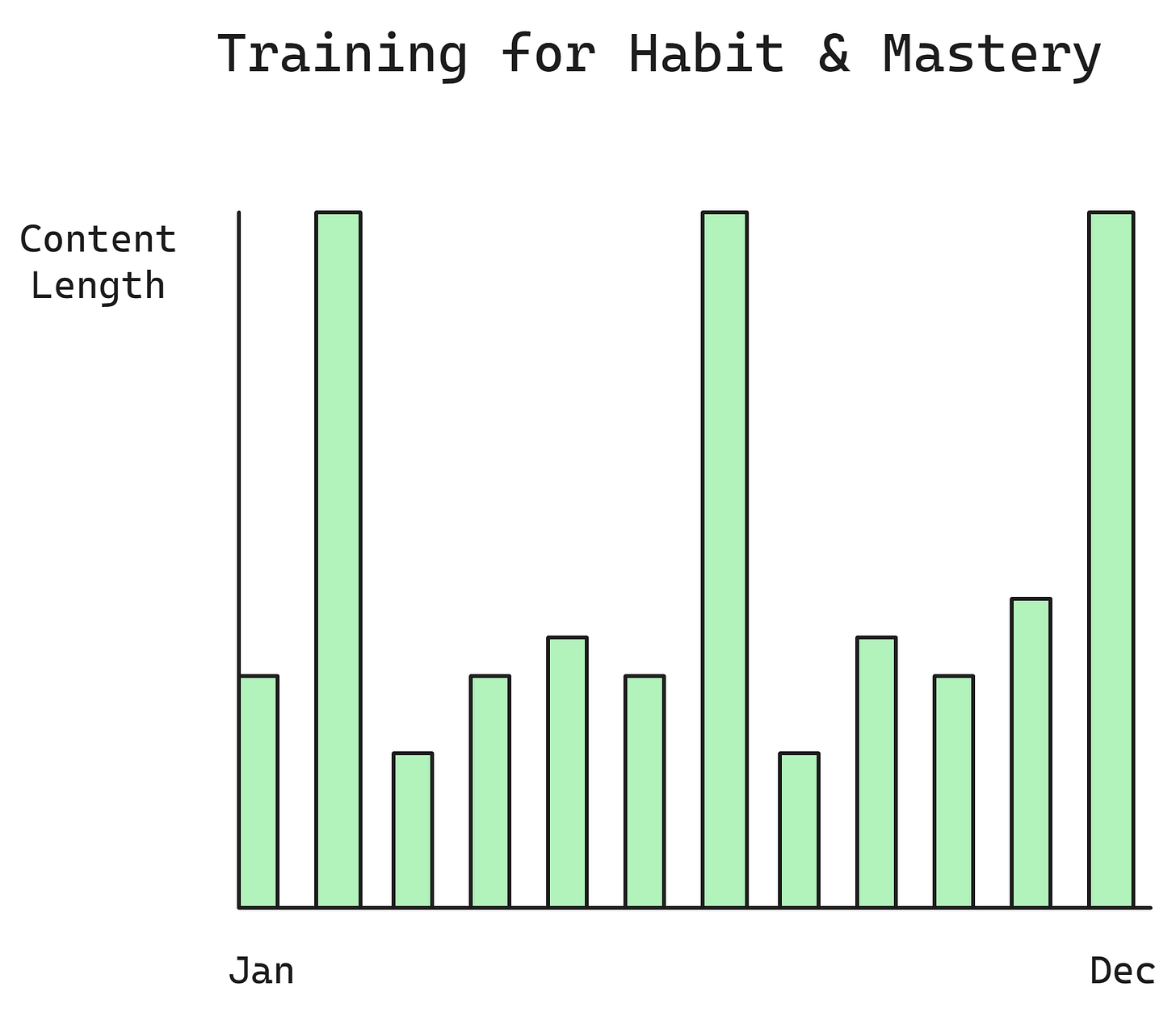Training for Habit and Training for Mastery
Training Modes for Reading, Writing, and more
I. In reading
When you’re new to reading, the most important thing to do is to establish a habit of reading.
Start with reading Threads, then small Essays, then a short book, then a novel. Increase the difficulty slowly. But you MUST increase the difficulty.
Because it is very easy to be comfortable with just reading a few Threads or short articles and thinking that you’ve truly mastered an area of knowledge. But you haven’t.
A lot of the information we consume is in the form of highlights, summaries, or distillations. It’s the illusion of knowledge. We learn the answer but can’t show our work. - Shane Parrish, Clear Thinking
If you’re stuck in reading short-form and summaries, what you have isn’t mastery.
What you have is an illusion.
Why reading summaries are not enough?
Every one of us has a certain lens through which we see the world. This lens is influenced by our lived experience, interests, and biases.
You and I can read the same article, but we might write up 2 completely different summaries.
When I re-read an article I read 3 months ago and compare my notes then and now, they can be vastly different.
The lens through which we see the world influences the kind of details we pay attention to.
When you’re reading a book summary, you’re reading a compilation of details that are relevant to the person summarizing the book; therefore, you might miss out on details relevant to you.
You’re saving time, at the cost of missing IMPORTANT information TO YOU.
So my advice is: Always read the original piece if you can.
You should start with easy, pleasant reads to build habits. Summaries are fine for general understanding.
But you MUST increase difficulty if you want to aim for mastery.
Great thinkers read originals for nuances, not just general ideas.
II. In writing
When you are new to writing, the most important thing to do is to get into the habit of writing.
And whether you like it or not, writing short-form content is easier than long-form. Hence, short-form writing is better for habit-building.

The mental energy, time, and skills required to produce a well-articulated 1000-word essay are significantly larger than writing a clear 200-word Thread.
Sure, you can create an incredible 4000-word essay for your first blog, but how long will it take you to ship a similar work again? 1 month? 2 months? 6 months? Or a few years?
New writers who delay writing because they’re preparing for their highest-quality blog are like new gym-ers who go to the gym once a month to work out for 10 hours.
By the time you’re back, people have probably already forgotten who you are.
That’s NOT how you get better.
In the beginning, you improve by showing up consistently and putting in the reps (of workout and writing).
In the beginning, the key is to focus on quantity and consistency.
Then what?
Then similar to reading, you have to slowly increase difficulty. Improve your skills and aim to create more high-quality, long-form content.
It is very easy to be comfortable with producing a few Threads or short viral blogs and having the illusion that you have “mastered the art of Writing Online”.
If you’re stuck in writing short-form and summaries, what you have isn’t mastery.
What you have is an illusion.
It is easy to hide what you don’t understand or haven’t thought through carefully in short-form content.
When you don’t say much, people won’t have much to criticize you.
Long-form writing requires you to lay out your best arguments, and organize them in a logical sequence, in a way that adds A LOT of value to readers (because why else would anyone read something longer if it doesn’t have significantly more values?).
If you want to write CLEAR, COMPELLING long-form content, your thinking has to be 10 times better than writing about the same idea in short form.
Short-form writing helps you build your writing muscles and habits.
Long-form writing helps you improve your thinking.
III. In conclusion
Reading and Writing alike:
Train for habits with short-form.
Train for mastery with long-form.
Train for both.
This principle doesn’t just apply to reading and writing. It applies to any skills you want to improve.
This is my 2-Training Mode Principle.
In the next few blogs, I’ll be sharing more Thinking Principles (or Mental Models) that I use religiously in my life. Stay Tuned!





